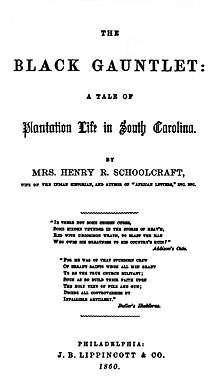The Black Gauntlet: A Tale of Plantation Life in South Carolina
 First edition title page | |
| Author | Mary Howard Schoolcraft (as Mrs. Henry Rowe Schoolcraft) |
|---|---|
| Country | United States |
| Language | English |
| Genre | Plantation literature |
Publication date | 1860 |
| Media type | Print (Hardcover and Paperback) & E-book |
| Pages | c. 100 (May change depending on the publisher and the size of the text) |
The Black Gauntlet: A Tale of Plantation Life in South Carolina (also known as simply The Black Gauntlet) is an anti-Tom novel written in 1860 by Mary Howard Schoolcraft, published under her married name of Mrs. Henry Rowe Schoolcraft.
Background
Mary Howard (d. 1878) was born into the planter slaveholding elite of South Carolina. She was the second wife of the widower and ethnologist Henry Rowe Schoolcraft, who was 53 when they married in 1846. They lived in Washington, DC and after their deaths were each buried in the Congressional Cemetery.[1]
The Black Gauntlet is an example of the pro-slavery plantation literature genre that was written in response to the anti-slavery novel Uncle Tom's Cabin (1852) by Harriet Beecher Stowe. Critics accused Stowe of exaggerating (or inaccurately depicting) Southern society, slaveholders, slaves and the institution of slavery in the South.[2]
The Black Gauntlet is unusual as a late example, as the majority were written and published soon after Uncle Tom's Cabin in 1852. The competing novels were part of the public, rhetorical arguments between North and South in the years of rising political and social tensions before the American Civil War.
Plot
Unlike other anti-Tom novels, The Black Gauntlet does not have a discernible narrative. It is essentially a collection of speeches by characters who argue in favor of American slavery as an institution. Some of the speeches were created by Schoolcraft. In other cases, she refers to quotations from other published works, including the Bible and Uncle Tom's Cabin.[3]
In other works
Schoolcraft's work used quotes which had also appeared in Aunt Phillis's Cabin (1852) by Mary Henderson Eastman, a native Virginian.[4]
References
- ↑ Mary Howard Schoolcraft at Find a Grave
- ↑ "Uncle Tom's Cabin", ENotes
- ↑ "The Black Gauntlet", Stephen Railton, Pro-Slavery Responses, Uncle Tom's Cabin & American Culture, University of Virginia, accessed 3 April 2011
- ↑ Preface of Aunt Phillis's Cabin - M.H. Eastman (1852)
External links
- The Black Gauntlet, text online
- OCLC 742997047, 123764